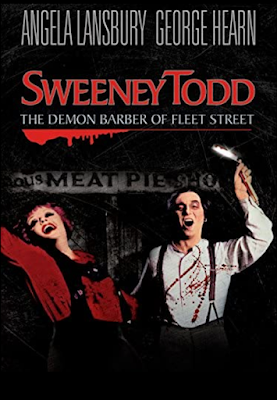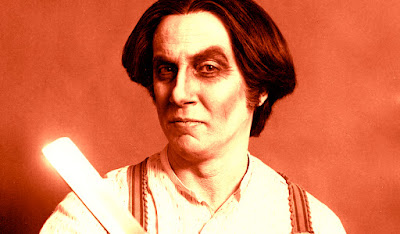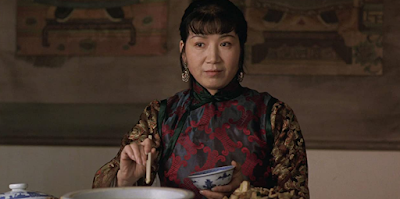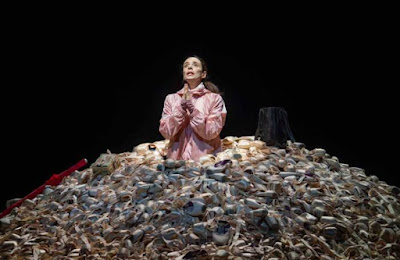Before Rock Hudson, Ian Charleson, Freddie Mercury and Keith Haring died, before ANGELS IN AMERICA and MY NIGHT WITH REG, before the UK's "Don't Die of Ignorance" campaign and Princess Diana shaking the hand of an AIDS patient, there was Larry Kramer's polemical play THE NORMAL HEART.
After it's 1985 Off-Broadway premiere, it quickly opened the following year at London's Royal Court in a production directed by David Hayman and starring US actor Martin Sheen as the combatative lead character Ned Weeks, based on Kramer himself. I was lucky to see it twice - Martin Sheen was a favourite actor - but the play hit like a sledge-hammer, Kramer's take-no-prisoners approach did a lot to make me aware, probably for the first time, what was happening around me.
It's a production that stayed with me, for the concentrated fury in the writing but also for the committed performances of Martin Sheen and Paul Jesson, who won an Olivier Award for his performance as Felix, a New York Times journalist who manages to break through Ned's emotional defences.
Kramer had already had success as a writer: his 1960s career working in London at Columbia Pictures culminated when he wrote the script for Ken Russell's WOMEN IN LOVE for which he was nominated for an Academy Award but he moved to trying his hand writing a gay play which flopped so he moved again to writing books. His 1978 novel "Faggots" annoyed gay readers who disliked it's negative view of gay promiscuity - and they remembered his name.
He had never been an activist but when friends started succumbing to a strange illness he arranged a meeting at his apartment with friends and a doctor who said that early research found the illness to be spreading. In 1982 they started the Gay Men's Health Crisis which became the leading support group in New York for AIDS sufferers. But as has happened so often before, the group soon were fracturing: Kramer wanted to push hard for funding from Mayor Ed Koch while the group's elected president Paul Popham wanted a less controversial approach.

Despairing that the group was not pushing harder, Kramer wrote a scathing article in a New York gay newspaper, condeming politicians and, controversially, closeted and Out gay men for ignoring their own health and the health of others. Welcomed by some, it was also derided by others who remembered him as the writer of "Faggots" and later that year, Kramer was unceremoniously dumped by the GMHC. He would have his revenge by writing THE NORMAL HEART and by helping set up AIDS Coalition To Unleash Power aka ACT-UP, a direct action group that hit hard with it's slogan SILENCE = DEATH.
In 1992 Kramer wrote a sequel to THE NORMAL HEART titled THE DESTINY OF ME which ran for a year Off-Broadway and was nominated for a Pulitzer Prize for Drama. Kramer died in 2020 aged 84 of Pneumonia, having lived with HIV for 33 years and long enough to see THE NORMAL HEART finally have a successful Broadway run in 2011 which won him a Tony Award for Best Revival, and now the National Theatre have given us a London revival, directed by Dominic Cooke, ironically a former artistic director of the Royal Court where THE NORMAL HEART had premiered.

There is no denying the force of anger that drives the writing but seen 35 years after the Royal Court production, Frank Rich's summing up in his review of THE DESTINY OF ME seems quite accurate "He has a good ear, but it's the ear of a journalist, not a poet". There are four speeches in THE NORMAL HEART when the dialogue lifts: when Ned is faced with expulsion from the group for his aggresive approach, he says he belongs to a culture that produced famous gay writers, composers, artists, politicians who are not invisible men in history, and also when Doctor Brookner angrily denounces the Government's medical board when her research grant is denied.
The character is based on Linda Laubenstein, a doctor who treated a patient for Karposi's sarcoma as early as 1979 and by 1982 was running a private practice just for the treatment of men with AIDS. Her anger at the silence around the men dying daily in front of her led her to become an activist for AIDS research and her insistance that the gay bath-houses of New York be closed to arrest the spread of the disease was praised by Kramer, less so by members of the gay community who viewed it as puritanism. Sadly she died in 1992 aged 45 of a heart attack.

Kramer has the good grace to give the other good speeches to Ned's critics - the closeted and polished Bruce Niles who is made president of the group because he projects a better image, has a moving speech about his partner dying in a hospital where, as no medical staff will touch him, a porter smuggles his body out in a body bag for a backhander. There is also a fine speech from fellow-activist Mickey Weeks, who cracks under the pressure of all that Ned expects from his comrades while they are trying to live through their own fears.
The production is designed by Vicki Mortimer as a gladiatorial circular arena - the Olivier is in the round presently - and Cooke seems to take his cue from that setting, so the scenes are usually blocked as two actors standing opposite each other or seated on opposing metal benches having at each other: an approach which eventually tires you out and you yearn for something to break up the 50/50 staging. I think the Olivier is too large a space for such a play.

I found much to like in Ben Daniels' Ned Weeks but he is onstage for nearly all the running time and I eventually wished for the variety of performance that Martin Sheen delivered: Ned's flashes of humour hardly registered. Dino Fetscher made for a strapping but dull Felix, I couldn't really believe in their relationship, or any of Fetscher's performance choices. Liz Carr as the motorised Dr Brookner had her moments: Brookner is there to punctuate the activists' shouting matches with cold, blunt facts and she certainly rose to the explosive speech where she finally lets her stoicism crack in the face of bigoted indifference but she too seemed to be playing an idea rather than a living character.
The rest of the cast seemed to be concentrating harder on their American accents rather than giving any noticeable performances - the exception being Daniel Monks as the put-upon Mickey although a special mention goes to Richard Cant who delivered two good cameos: as a patient of Dr Brookner who remembers serving Ned in a store, and as the icy (and closeted) Mayor's assistant.
One cannot help but think of COVID as the ethics of how to deal with a pandemic where being loudly debated onstage but one hopes that this was not the sole reason for the play's appearance in the repertoire: those suffering and dying with AIDS were blamed solely for their predicament by the world at large.
I am glad I saw this revival but suspect I will always have that first production to draw on. Dominic Cooke has a prologue to the play: the cast form a circle around a burning cauldron for what seems like a minute's silence and suddenly the stage is plunged into darkness only to be hit by strobe lights as the age of Disco is embodied by - you guessed it - Donna Summer's I FEEL LOVE blaring out. I FEEL LOVE - that lazy shortcut to suggest decadence. Mind you, as lazy shortcuts go, it's always worth a blast.






































